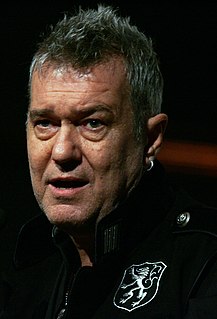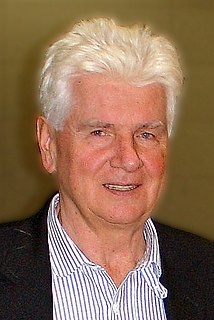A Quote by Jimmy Barnes
Where I lived in Glasgow looked like Dresden after the war. It was a bomb site. I don't think I'd ever played football on grass until I moved to Australia.
Related Quotes
I knew that I'd lived in New York too long when, a few years ago, I was on a subway going downtown, and it stopped at 14th Street. At the station, the doors opened, and the conductor announced that there was a bomb on board and we should evacuate immediately. Nobody moved. We just looked at each other, 'Do you see a bomb?' 'I don't see a bomb.' 'There's no bomb.' 'I've only got two stops - let's go for it.
All my life I've been aware of the Second World War humming in the background. I was born 10 years after it was finished, and without ever seeing it. It formed my generation and the world we lived in. I played Hurricanes and Spitfires in the playground, and war films still form the basis of all my moral philosophy. All the men I've ever got to my feet for or called sir had been in the war.
The war tried to kill us in the spring. As grass greened the plains of Nineveh and the weather warmed, we patrolled the low-slung hills beyond the cities and towns. We moved over them and through the tall grass on faith, kneading paths into the windswept growth like pioneers. While we slept, the war rubbed its thousand ribs against the ground in prayer.
I did not know much history when I became a bombardier in the U.S. Air Force in World War II. Only after the War did I see that we, like the Nazis, had committed atrocities... Hiroshima, Nagasaki, Dresden, my own bombing missions. And when I studied history after the War, I learned from reading on my own, not from my university classes, about the history of U.S. expansion and imperialism.
I want the marginality to come into the center. This is the thing I was conscious of growing up, when I later lived in England. I saw all these war movies that came out shortly after the war, and they were all about the war being fought by Englishmen or Americans, there were no other "allies" in it - from India or Australia, etc.
Early on, before rock 'n' roll, I listened to big band music - anything that came over the radio - and music played by bands in hotels that our parents could dance to. We had a big radio that looked like a jukebox, with a record player on the top. The radio/record player played 78rpm records. When we moved to that house, there was a record on there, with a red label. It was Bill Monroe, or maybe it was the Stanley Brothers. I'd never heard anything like that before. Ever. And it moved me away from all the conventional music that I was hearing.



































